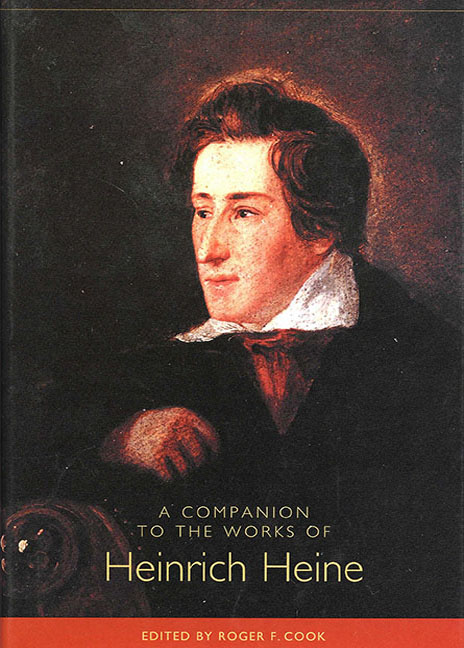Book contents
- Frontmatter
- Contents
- Acknowledgments
- Chronology of Heine's Life
- Heine's Major Works
- List of Abbreviations
- Introduction
- The Romantic Poet
- Philosophy, History, Mythology
- Religion, Assimilation, and Jewish Culture
- Troubled Apostate: Heine's Conversion and Its Consequences
- Heine and Jewish Culture: The Poetics of Appropriation
- Modernity: Views from the Poet's Crypt
- Reception in Germany
- Notes on the Contributors
- Index
Heine and Jewish Culture: The Poetics of Appropriation
from Religion, Assimilation, and Jewish Culture
Published online by Cambridge University Press: 29 July 2017
- Frontmatter
- Contents
- Acknowledgments
- Chronology of Heine's Life
- Heine's Major Works
- List of Abbreviations
- Introduction
- The Romantic Poet
- Philosophy, History, Mythology
- Religion, Assimilation, and Jewish Culture
- Troubled Apostate: Heine's Conversion and Its Consequences
- Heine and Jewish Culture: The Poetics of Appropriation
- Modernity: Views from the Poet's Crypt
- Reception in Germany
- Notes on the Contributors
- Index
Summary
Heine research is famous for the debates it provokes, and perhaps no question is less settled than that of Heine's response to Jewish culture, a question also bound up with that of Heine's place in German culture. Critics have sought in various ways to resolve this question, which Oskar Walzel, writing a century ago, asserted to be “the most important problem in the field of Heine research.” This article seeks to intervene in the discourse on the question of Heine, Jewish culture, and Jewish identity, and, it is hoped, to offer an alternative approach to those questions. It argues first that any attempt to find the key to or essence of Heine's work in his Jewishness is misguided. It also questions the view that Heine's response to Jewish culture was inauthentic or somehow detrimental to Jewish life. And it further questions the claims, most notoriously made by German nationalists, that Heine's Jewishness made his writings less authentically German. For all their differences, these claims display a problematic structure that lends them a disturbing resemblance to one another. That structure rests on a prescriptive view of group identity — a view (of Jewishness or Germanness) that, in each case, excludes from German life or Jewish life expressions of that life that fail to conform to its norms. Yet, Heine's work does relate in important and complex ways to Jewish culture and the place of Jews in Germany. Indeed, the complexity of this relationship invests it with greater, rather than less, importance, since it also raises more general theoretical questions about the ways that literary works relate to problems of identity, the social world, ideology, poetics, and the culture(s) — dominant or nondominant — that impinge upon and are shaped by those works.
In exploring these problems, I wish in this article to focus especially on two distinct but related questions, the first regarding the status of the poetic or fictional utterance and its relationship to the historical figure of the writer, and the second related to the position of the writer in society, both of which were issues that Heine himself responded to at various times. In an 1823 letter to Immermann, for instance, Heine questioned the value of historical approaches to poetic works:
- Type
- Chapter
- Information
- A Companion to the Works of Heinrich Heine , pp. 251 - 282Publisher: Boydell & BrewerPrint publication year: 2002



